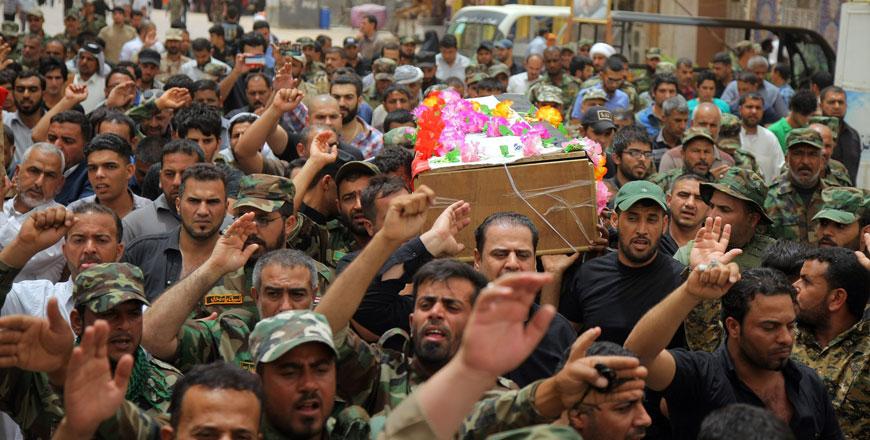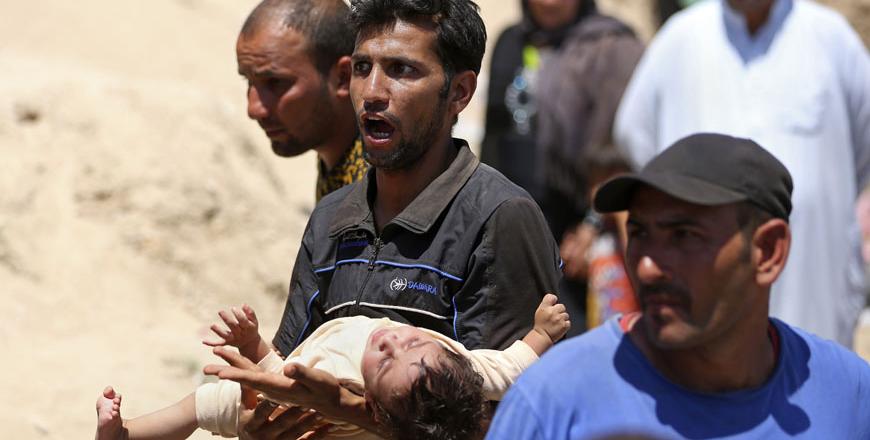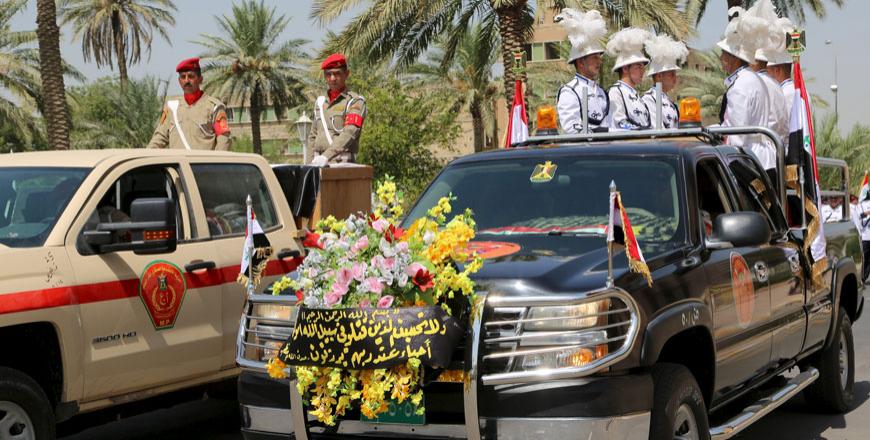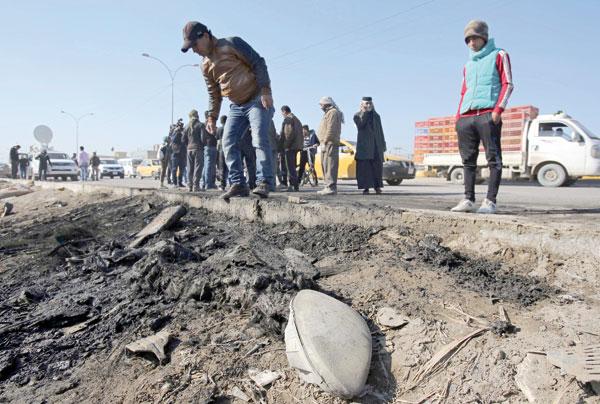You are here
Daesh suicide attacks in Iraq’s Anbar kill 17 troops
By AP - May 27,2015 - Last updated at May 27,2015

Mourners chant slogans against the Daesh group as they carry the flag-draped coffins of three members of Peace Brigades, a Shiite militia group loyal to Shiite cleric Moqtada Al Sadr, who were killed in Ramadi from fighting with Daesh militants, according to their families, during their funeral processions in Najaf, 160 kilometres south of Baghdad, Iraq, on Wednesday (AP photo)
BAGHDAD — Daesh extremists unleashed a wave of suicide attacks targeting the Iraqi army in western Anbar province, killing at least 17 troops in a major blow to government efforts to dislodge the militants from the sprawling Sunni heartland, an Iraqi military spokesman said Wednesday.
The attacks came just hours after the Iraqi government on Tuesday announced the start of a wide-scale operation to recapture areas under the control of the Daesh group in Anbar.
Brig. Gen Saad Maan Ibrahim, the spokesman for the joint military command, told The Associated Press the attacks took place outside the Daesh-held city of Fallujah late Tuesday night.
The militants struck near a water control station and a lock system on a canal between Lake Tharthar and the Euphrates River where army forces have been deployed for the Anbar offensive, he said.
Ibrahim added that the Daesh extremists used a sandstorm that engulfed most of Iraq on Tuesday night to launch the deadly wave of bombings. He said it was not clear how many suicide attackers were involved in the bombings but they hit the military from multiple directions.
Last month, the water station near Fallujah fell into the hands of Daesh militants — following attacks that also included multiple suicide bombings and that killed a general commanding the 1st Division and a dozen other officers and soldiers, he said.
Iraqi government forces recaptured the station a few days later. Fallujah lies to the east of the Anbar provincial capital of Ramadi, which was captured by the Daesh militants nearly two weeks ago in what was a major, humiliating defeat for Iraqi troops at the hands of the extremists.
The Iraqi operation to retake Anbar, which is said to be backed by Shiite militias and Sunni pro-government fighters, is deemed critical in regaining momentum in the fight against the Daesh.
The extremists captured Ramadi in Iraq and the Syrian ancient town of Palmyra earlier this month, showing that it is able to advance in both countries despite months of US-led air strikes. Capt. Andrew Caulk, a US air force spokesman in Qatar, told the AP it will continue to provide air support "to government-controlled Iraqi forces" throughout the country, including near Ramadi, where it has been carrying out air strikes for several months.
In Palmyra, Syrian activists said Daesh militants shot dead a group of detainees in the Roman theatre in the town's ancient ruins after gathering people to watch. They said Daesh gunmen killed at least 15 men after accusing them of having fought with President Bashar Assad's troops.
The incident — the first since the group captured the historic town — was reported by activists belonging to a Palmyra-based media collective and the Britain-based Syrian Observatory for Human Rights.
The theatre is part of the 2,000-year-old Roman-era ruins in Palmyra.
Syria's foreign minister also said Wednesday that his government is not pinning any hopes on the US-led coalition striking at Daesh group militants in his country.
At a news conference in Damascus, Walid Mouallem said the coalition was active in preventing the Kurdish town of Kobani from falling to the extremists last year but that this support seems to have "evaporated" after that.
The United States did nothing to prevent the ancient town of Palmyra in Syria or the province of Anbar in Iraq from falling into their hands, he said.
"We're not pinning any hopes on that alliance and anyone who does is living an illusion," Mouallem added.
Mouallem also said Iraq and Syria were fighting the same battle but added that security coordination between their two armies "has not reached the desired levels”.
Also Wednesday, Syrian activists said the Daesh group released two elderly Christian women who had been held along with dozens of others since February in northeastern Syria.
At the time, they kidnapped more than 220 Assyrian Christians after overrunning several farming communities on the southern bank of the Khabur River in Hassakeh province.
The two women, who are 70 and 75 years old, were released on Tuesday and have now reached the northwestern city of Hassakeh, said Osama Edwards, the director of the Assyrian Network for Human Rights.
Another activist group, the Syrian Observatory for Human Rights, said the two were likely released because of their poor health. Some of the captives had been released previously.
Edwards said the Daesh group is still holding 210 Assyrian Christians and is demanding $100,000 for each hostage.
Related Articles
BAGHDAD/BEIRUT — Shiite Muslim militiamen and Iraqi army forces launched a counter-offensive against Daesh insurgents near Ramadi on Saturda
BAGHDAD — A Daesh suicide bomber killed two Iraqi army generals on Thursday as they led forces against Daesh positions in the turbulent Anba
BAGHDAD — Several attacks in and around Baghdad, including a suicide car bombing in a busy commercial area after nightfall on Thursday, kill














